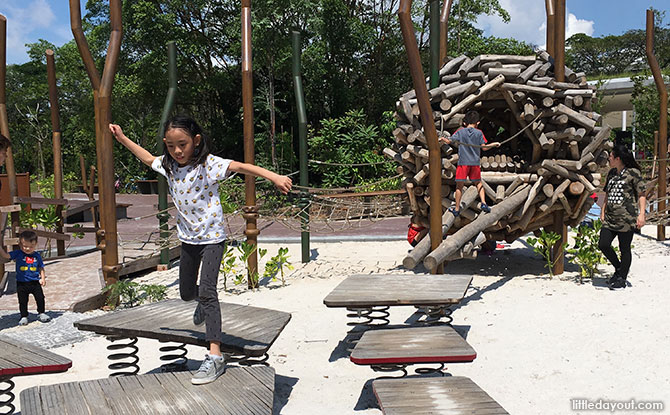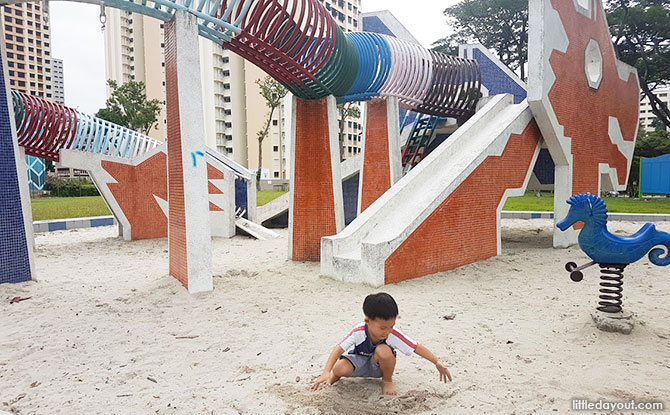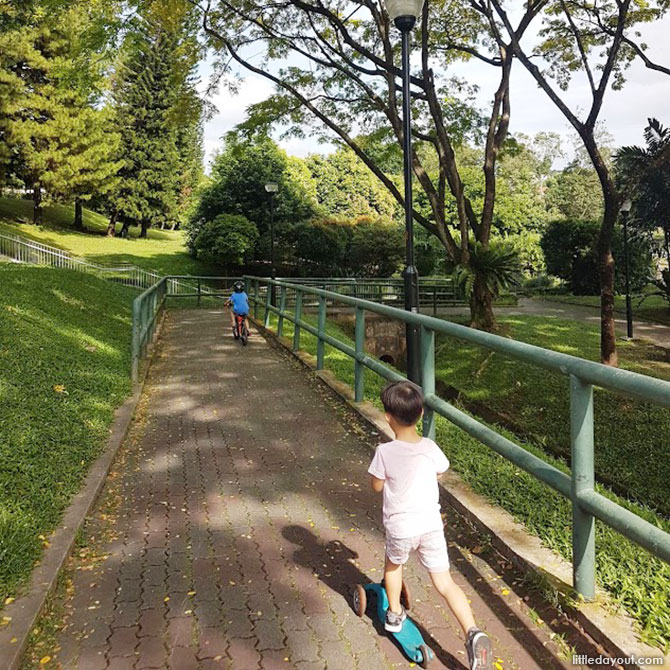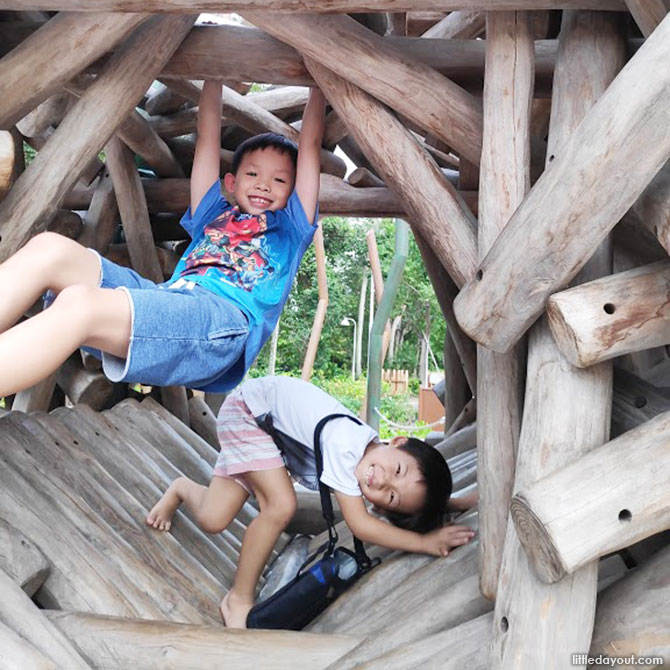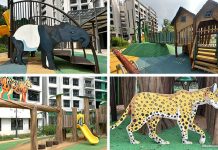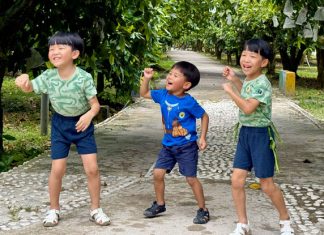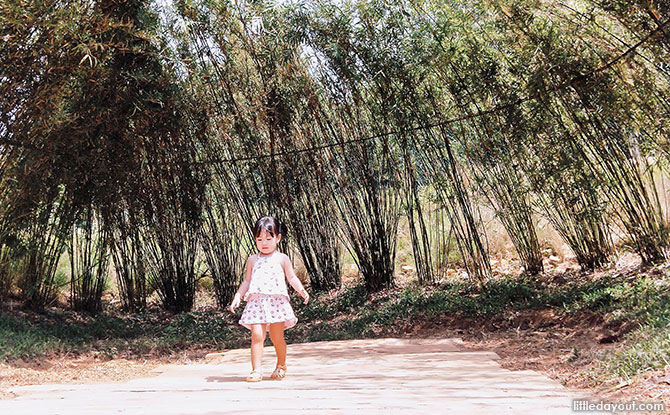
“What outdoors?” Many might wonder about the lack of “outdoors” in our urban landscape. After all, we are usually surrounded by concrete. Playing outdoors is not as challenging as you may think. Considering the vast number of playgrounds and parks we have, we are possibly the world’s first in number of playgrounds per capita and there are many benefits of letting kids play outdoors.
At HDB estates, you can find a small park or a playground within a stone’s throw away. These days we can take the park connector, see wildlife in our cityscape and enjoy the great outdoors!
But why play outdoors? After all, there are risks such as mosquitos and dengue fever, elements such as the humidity and more unpredictable factors. Some of these risks are easily managed. For instance, repellent and long-sleeved attire can help.
Outdoor play engages children in learning to manage these risks and build up resilience through overcoming obstacles and challenges! We think there are many benefits of outdoor play precisely because there is some risk.
GIVEAWAY: Stand to Win Family Tickets to ZOOOM by Patch Theatre Worth $200
3 Recycling Adventures: Fun Ideas For Kids & Families
1:1 & Small Group English Lessons: How to Get Personalised, English Help
The Consequences of Not Playing Outdoors and “Nature Deficit Disorder”
The lack of outdoor play can result in “nature deficit disorder” according to journalist Richard Louv. Consequences include more stress and anxiety, higher rates of obesity, ADHD and more. We probably got a glimpse of this when many of us were shut up indoors recently. Weight gain, conflicts at home, excessive screen time leading to myopia were all symptoms manifested by the lack of mobility and outdoor time.
Parents and caregivers can definitely mitigate these issues by encouraging children to play outdoors, with precautions taken and the appropriate attire worn.
Benefits of Playing Outdoors
Let’s face it, we are pragmatic beings and parents often look for tangible benefits for any activity their child is engaged in. There are plenty of benefits of playing outdoors and here’s why outdoor play should be encouraged!
1. Outdoor play nurtures creativity and confidence
Whether it is a playground or a natural landscape, children are encouraged to think out of the box in navigating obstacles – from a puddle, to a stream or a structure to climb on. The constant problem solving is there as they determine how high they can climb, how far they can leap and how to get across. This trains children in creativity and confidence building. I personally saw how my son tried to navigate a monkey bar that was meant for adults, and he finally figured out a way to reach the top to swing across the bar. He became more confident and could climb onto more complex structures after that self-validating experience.
Creativity and confidence are essentials that are easily honed through outdoor play. This trains them for bigger challenges in life and instils the desire to keep progressing. Don’t we all want to nurture lifelong learners who do not bow down to difficulties?
2. Helps reduce myopia
It has been proven that more outdoor time translates to better eyesight, as the eyes are focused on objects of varying distances. With the prevalence of myopia among the highest in the world and 63% of our children being myopic by the age 12 – these staggering figures suggest insufficient outdoor time and too much “near work”. That is certainly no excuse for not doing your homework, but it can be balanced with some dedicated outdoor time. A 2015 World Health Organisation report on myopia pointed out that two hours a day spent outdoors reduced the risk of myopia even if parents have myopia.
For the sake of your eyes, head out as a family!
3. Increases IQ!
Did you know that hanging out outdoors can raise intelligence levels? The longitudinal birth cohort study of twins concluded that green spaces are beneficial for the intellectual and behavioral development of ‘city kids’. Another study in Barcelona showed that green spaces improved working memory and attention. There is some hope for forgetful children then – send them outside more often! Apart from them, you can also feed them well.
4. Engages all senses
All children need sensory input for effective cognitive functioning and developing. This helps them to learn, leap, get directions and regulate their emotions. Apart from the five senses, there are also vestibular and proprioceptive senses that are sometimes neglected. Vestibular sense refers to spatial orientation while proprioception is the ability to sense body movement, position and balance.
Outdoor play is one good way to engage all the senses to keep children moving, thinking and observing. Taking a walk in a park, looking for spiders, fishing, playing at the sand playground are all ways to engage the children’s senses. Compared to screentime which is much more passive activity, outdoor play is a great workout for the entire body.
5. Boost immunity and Vitamin D
A superb way of boosting immunity is through playing under the sun – and getting lots of Vitamin D. Many in Singapore are actually Vitamin D deficient. A free and readily available source of Vitamin D is none other than the sun. Thus, heading out is actually great for immunity plus strong bones.
6. Stress reduction and improved mental well-being
Being outdoors taking in fresh air, looking at greenery reduces stress and improves mental well-being. It is refreshing to head to a park, beach or forest for a dose of “nature therapy”. Likewise, children who can be under much stress in school need time outdoors to feel relaxed, calm and just enjoy the breeze. This has been proven to affect how children focus in class and how well they can get along with others. So perhaps, sometimes all they need is a little adventure outdoors.
7. Appreciating Our World and Nature
Outdoor play also gives children a sense of identity and appreciating the world around them. Knowing their place, seeing nature all around, learning to navigate to and fro home are lifelong skills. These are also foundational to cultivating a love for earth and raising eco-conscious children. Interacting with plants, insects, wildlife helps them to learn beyond the textbook or even apply these knowledge better after hands-on experiences.
Outdoor Play is Best!
Playing outdoors has plenty of benefits and unrivalled experiences that screentime cannot replicate. The fondest memories of childhood are usually those of running wild, playing freely as a child should. Let’s embrace the great outdoors, learn to step out of our own fears and comfort zone. There could be many discoveries about your child you may be surprised with!






